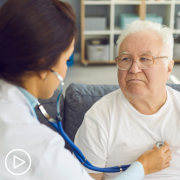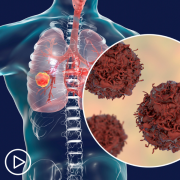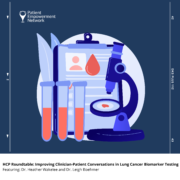What Are the Advantages of Newer Lung Cancer Treatment Approaches?
What Are the Advantages of Newer Lung Cancer Treatment Approaches? from Patient Empowerment Network on Vimeo.
Lung cancer expert Dr. Heather Wakelee shares insight about how newer treatments, such as targeted therapy and immunotherapy, impact quality of life and patient outcomes.
Dr. Heather Wakelee is a thoracic medical oncologist and deputy director of the Stanford Cancer Institute where she also serves as the division chief of medical oncology. Learn more about Dr. Wakelee, here.
See More From INSIST! Lung Cancer
Related Programs:

How Are Targeted Therapy and Immunotherapy Used in Lung Cancer Care? |

|

|
Transcript:
Katherine:
Right. What are the advantages of these new treatment approaches compared to standard chemotherapy?
Dr. Wakelee:
Well, I think the most exciting news that we’ve seen in lung cancer over the last few years is that we’re actually helping more people live longer. And the way that we’re doing that is through these newer treatments. So, when we can personalize treatment by recognizing that a person’s cancer has a specific gene mutation and we can give them the right targeted pill drug, we can help them live longer and feel better because those often have fewer side effects. Wish I could say they were curing the disease, but they’re helping people live longer.
And, that can be measured in years for some folks, which is fantastic. And then, with immune therapy, again, they’re not working for everybody, but they were for a large number of patients with lung cancer with non-small cell to help them live longer with their cancer controlled. And so, we’ve actually improved the overall survival rates for lung cancer with these new developments. Where we can make even more of an impact is also by finding more of the cancers earlier, and that’s where cancer screening is so important also. So, by having more choices, chemotherapy can still help a lot of people. Targeted therapies can help probably close to 20, 30, 40 percent of people with non-small cell lung cancer that’s the adenocarcinoma type.
And then, the immune therapies can help other people living with lung cancer. Usually immune therapies don’t work on the same tumors the way the targeted pills work. So, you’re kind of getting at different groups of people with those different strategies. It’s not completely true, but it’s a kind of general principle about it.
Katherine:
What about side effects for some of these treatment choices?
Dr. Wakelee:
So, chemotherapy is one people fear the most, but I think it has a bit more of a bad reputation than it needs. A lot of the lung cancer therapies that are chemotherapy can be reasonably tolerated. I mean, I’m not signing up to go get chemotherapy just because. There definitely are side effects. The biggest one is people get fatigue, get really tired. Though, if they’re feeling horrible because of the cancer, a lot of times people feel dramatically better. But, tiredness, it can impact appetite a little bit, though cancer does that also. There can be nausea, vomiting, but we’re much better at controlling that with the newer drugs. Some cancer therapies cause hair loss, but a lot of our non-small cell lung cancer therapies don’t cause hair loss. So, there are a lot of options there you can talk about with your doctor. And then, when the blood counts are low, there can be risk for infection, low red blood cells with anemia.
So, there are a lot of different things. But in general, chemotherapy is better tolerated than people think it’s going to be because in the movies, they make it look horrendous.
With the pill therapies, again, lots of variability depending on the specific pill. Some of them cause rash. Some don’t. Some of them can cause some changes to the heart that we have to monitor with EKGs, electrocardiograms, some don’t. Some cause some changes to labs like for liver tests that we have to monitor. Some don’t. Some cause hair color changes. Some don’t. It’s always to gray, unfortunately.
So, there are a lot of different variations in what different treatments can do. And so, it’s just really important if your doctor is talking with you about starting one of the targeted pill drugs that you really ask what are the side effects I need to be watching for, what are the ones I need to know to call you about, and which are the ones I just know, “Okay, this is happening and it’s okay. It’s going to cause swelling in the ankles,” no, just a huge range of them. And then, with the immune therapy drugs, they tend to be mostly fatigue, just like with chemotherapy, though some people feel fine.
What we have to watch for is that they can cause what we call autoimmunity. So, it’s talking about the fact that the way they work is they help the immune system better recognize the cancer, and they do that by taking away one of the stop signals. But that stop signal, the PD-1, PD-L1, that stop signal is also used by a lot of normal cells to tell the immune system to back off.
So, when you remove it, when you block it, the immune system can get confused and start to attack normal cells. So, you can get a rash, people can end up with gut symptoms like diarrhea, they also can end up with it attacking the lungs and causing what we call a pneumonitis lung inflammation or brain symptoms, so, almost anything. Now, those are rare, and we can treat them with steroids. But, people need to be aware that if something new is happening, they need to alert their doctor. I think sometimes, there’s this false impression that immune therapy is completely safe, but, it’s not. And, all of the treatments that I’m talking about are designed to help people live better and live longer when they’re dealing with lung cancer, but they all also have risk.
And so, it’s just really important to have those discussions with the care team as you’re starting something new about what are the things I need to be watching for and to know how to reach people if you’ve got a new and concerning symptom, especially if you’re starting on something new.










